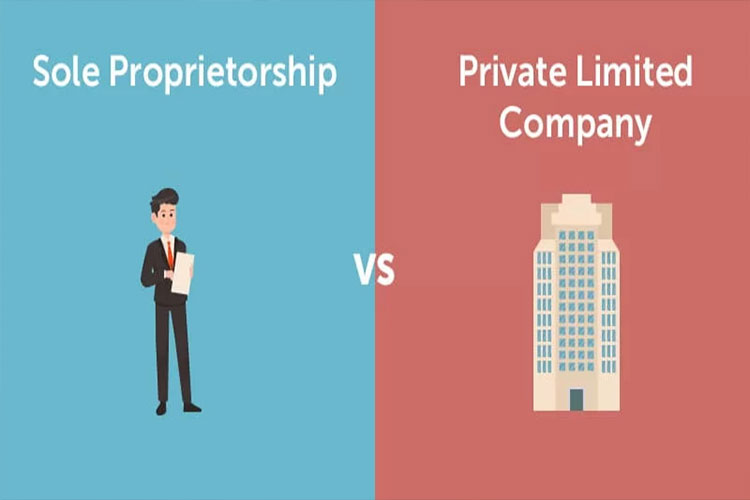

When launching a new business in India, one of the most important decisions you'll make is choosing the right business structure. Many startups and small businesses often choose a Private Limited Company (Pvt Ltd) or a Sole Proprietorship. Both have their own benefits, but they differ a lot in ownership, legal status, compliance needs, taxes, and fundraising.
In this guide, we will look at the main differences between a Private Limited Company and a Sole Proprietorship. We will help you choose which one is better for your business needs.
What Is a Sole Proprietorship?
A sole proprietorship is the simplest and most common type of business in India. In this model, one person owns and runs the business. There is no legal difference between the owner and the business.
This type of business is great for freelancers, consultants, local shops, and small service providers. They can start with little paperwork and few rules.
Key Features of a Sole Proprietorship:
-
Single ownership and control
-
No separate legal entity
-
Minimal regulatory requirements
-
Taxed as personal income of the owner
-
Not subject to mandatory audits unless under certain income thresholds
A sole proprietorship is simple to set up. It can be done quickly and costs less than registered companies.
What Is a Private Limited Company?
A Private Limited Company is a formal business type. It is registered under the Companies Act, 2013 with the Ministry of Corporate Affairs (MCA). This company can have 2 to 200 shareholders. It is a separate legal entity from its owners.
In India, a Private Limited Company has corporate status. It also offers limited liability protection. This type of company has better access to investment and bank funding.
Key Features of a Private Limited Company:
-
Separate legal identity
-
Limited liability of shareholders
-
Registered with the Registrar of Companies (ROC)
-
Mandatory annual compliance and audit
-
Can raise funds from investors or venture capitalists
This structure is ideal for entrepreneurs aiming to scale their business, protect personal assets, and attract funding.
Major Differences Between Private Limited Company and Sole Proprietorship
Understanding the differences between a Private Limited Company and Sole Proprietorship is crucial before choosing your business model. Let’s break down the comparison across several critical factors.
1. Legal Status and Ownership
A Private Limited Company is recognized as a separate legal entity. It has its own PAN number, bank accounts, and legal responsibilities. The business can sue or face lawsuits independently of its directors or shareholders.
In contrast, a Sole Proprietorship has no separate legal identity. The owner is personally responsible for all liabilities and debts. Legally, the business and the proprietor are the same entity.
2. Liability Protection
One of the key benefits of a Private Limited Company is limited liability. Shareholders are liable only to the extent of their shareholding. Their personal assets are not at risk if the company faces losses or legal claims.
In a Sole Proprietorship, the owner bears unlimited liability. If the business cannot pay its debts, creditors can use the proprietor’s personal assets to settle the obligations.
3. Registration Process
Setting up a Private Limited Company requires registration with the Ministry of Corporate Affairs (MCA). This includes obtaining a Digital Signature Certificate (DSC), Director Identification Number (DIN), and filing for Incorporation using SPICe+ forms.
A Sole Proprietorship does not require formal registration with the MCA. You may need some basic registrations. These can include a GST certificate, Udyam Registration, or a Shop and Establishment license. The requirements depend on your business type and state rules.
4. Taxation
In a Private Limited Company, business profits are taxed at a corporate tax rate of 22%. This rate applies to domestic companies that do not use any exemptions. Additional surcharges and cess may also apply.
In a Sole Proprietorship, the business income is the owner's personal income. It is taxed based on individual income tax rates. This can help small earners, but it may not be as good for growing businesses.
5. Compliance and Annual Filings
A Private Limited Company must adhere to mandatory annual compliance, including:
-
Filing Annual Returns with the Registrar of Companies (ROC)
-
Holding Board Meetings and Annual General Meetings (AGMs)
-
Statutory Audit regardless of turnover
A Sole Proprietorship has very few rules to follow. Audits are needed only if income exceeds certain limits. These limits are ₹1 crore for businesses and ₹50 lakh for professionals.
6. Fundraising and Investment
Private Limited Companies are preferred by investors, banks, and venture capitalists. They can issue shares and raise capital from private equity investors or angel investors.
Sole Proprietorships cannot raise money by selling shares. They mainly rely on personal savings, friends, family, or bank loans, which can be hard to get.
7. Transferability and Continuity
Shares in a Private Limited Company can be transferred. This makes it easier to add new partners or leave the business. The company continues to exist even if a shareholder dies or resigns.
A Sole Proprietorship is linked to the owner's identity. The business ends if the owner dies or decides to close it. It does not have continuity or transferability.
Which Is Right for You: Private Limited Company or Sole Proprietorship?
If you’re starting a small business with minimal risk, a Sole Proprietorship may be the right choice. It’s easy to set up, cost-effective, and offers full control.
To grow your business, you should consider a Private Limited Company. It helps limit liability. It also attracts investment. Plus, it creates a structured organization. This option is better for the long term.
Factors to consider before choosing:
-
Your business goals
-
Need for funding or loans
-
Nature of risk and liability
-
Plans for expansion or exit
-
Regulatory and compliance capabilities
Conclusion
Choosing the right business structure is very important for you as an entrepreneur. You need to decide between a Private Limited Company and a Sole Proprietorship. Sole proprietorships are great for small, low-risk businesses with little money. Private limited companies provide better legal protection, growth potential, and access to funding.
Before making your decision, consult with legal and financial advisors or professional firms like Madaliya.com, which specialize in company registration, GST filing, business compliance, and startup consulting in India.
You should understand the differences between a Private Limited Company and a Sole Proprietorship. This knowledge will help you choose the best structure for your business goals. It will also meet your legal needs.
FAQ's:
1. What is the main difference between a Private Limited Company and a Sole Proprietorship?
The main difference is that a Private Limited Company is its own legal entity. Its owners have limited liability. In contrast, a Sole Proprietorship is owned and run by one person. This person has unlimited liability for debts and losses.
2. Which is easier to start: a Sole Proprietorship or a Private Limited Company?
A Sole Proprietorship is easy to start. It requires little paperwork and basic tax registrations. There is no need for MCA registration. In contrast, a Private Limited Company involves more formalities, including registration with the Ministry of Corporate Affairs (MCA).
3. Can I raise funding with a Sole Proprietorship?
Raising funds as a Sole Proprietor is difficult because you cannot issue shares or equity. A Private Limited Company is a popular choice for startups and investors. It allows for equity funding and venture capital investment.
4. Which structure is better for tax planning in India?
A Private Limited Company is usually better for tax planning when your profits increase. It is taxed at a flat corporate rate. The tax system for a Sole Proprietorship applies individual income tax slabs, which may benefit small businesses.
5. Can someone convert a Sole Proprietorship into a Private Limited Company later?
Yes, a Sole Proprietorship can change into a Private Limited Company. This requires a clear legal process. You need to transfer assets and register properly with the Registrar of Companies (ROC).






